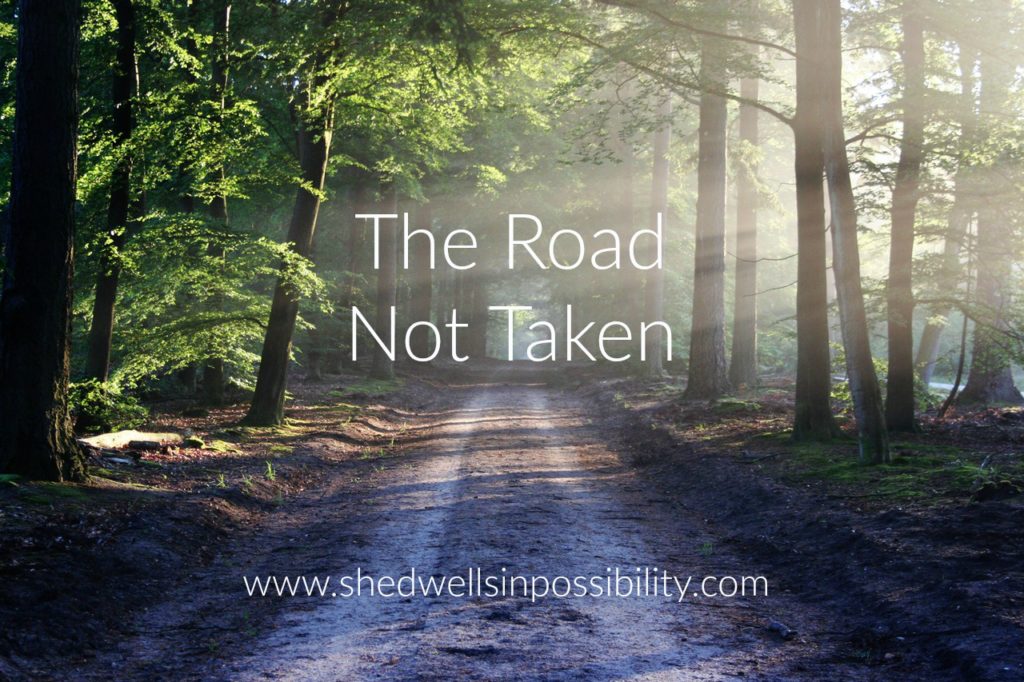Chances are, you know the Robert Frost poem with which this post shares a title. What you may not know is that it’s one of the most widely misread poems in the world. (This article does a very good job of explaining why.)
Many people take lines from this poem out of context and skip over the parts that don’t fit in with what they think it says. Parts, for instance, like the lines that describe the two roads in question:
The passing there
Had worn them really about the same,
And both that morning equally lay
In leaves no step had trodden black.
That’s right: the two roads are essentially the same. Nevertheless, the speaker of the poem keeps thinking about the road he didn’t take. That road is the one that gets top billing in the title.
Many people think this poem is called “The Road Less Traveled,” in reference to the path the speaker chooses.
Nope. It’s actually about the other one–“The Road Not Taken.”
I think it’s natural to revisit the choices we’ve made and wonder why we made them. It’s natural to question others’ decisions, too. Before the days of Facebook, Mike and I used to say that we’d like to have video footage of various friends we’d lost touch with. We didn’t necessarily want to go out to dinner and catch up, but we were interested in knowing where they’d ended up.
Back then, we could only guess how various friends’ lives had turned out. And in some cases–once Facebook let us check the facts–we were right. But in others, we were way off the mark. We couldn’t foresee the roads along which those friends would travel. We couldn’t have guessed that some would end up living in foreign countries or dying young. Others surprised us by hitting their stride later in life, thriving as new career paths in the tech industry began to develop. No way we could have seen that coming, either.
Which just goes to show how, as the Frost poem tells us, “way leads on to way”: you make one choice, and it leads to another. Perhaps you couldn’t see far enough ahead to know that you’d be faced with that second choice, but there it is. This is the road you’re traveling now. It offers only set of options.
That’s the most appealing part of the “road not taken”–when you haven’t yet chosen it, anything still feels possible. It’s easy to imagine the wonderful options you would have discovered just around that next bend.
When we lament not taking that road, we do it precisely because we don’t know what choices it would have led to. We can assume those choices would be different from those we’ve actually faced, but we don’t know that for sure. The other road might simply have been an alternate path to the same destination.
Whenever I think about any of the big decisions I’ve made–especially when I’m feeling regretful–I try to remind myself that there’s no way of knowing where any other choice would have led me. No decision creates a certainty. If I’d been a more responsible college student, a diligent writer, a frugal consumer–maybe my whole life would be different.
But maybe not. Maybe I would have made different decisions and they would have led to this exact same place. Who can say?
That’s one of the reasons I’m so frustrated by people who want to justify the bad stuff that happens in our lives. They often do this by claiming “If you hadn’t gone through that, you wouldn’t be where you are today.”
I don’t think that’s true. There’s more than one road to most places on the map.
Perhaps more importantly, though, going through bad stuff doesn’t guarantee good stuff is up ahead. We all know someone who seems to be living a charmed life, avoiding all the difficult spots. Is that smooth road somehow less enjoyable? I doubt the people living those very pleasant lives would agree.
True, if you end up going through a rough patch, you might be more appreciative when the road smooths out again–but that’s a choice as well. You could just as easily arrive at the good place bitter and frustrated, thinking It’s about damn time.
The number of pathways through this universe of possibility cannot be counted. But, as Frost reminds us, none of us can choose more than one–and that’s why regret is useless. It does no good to think if only after the moment of decision has passed. All you can do is move forward in whatever direction you’ve chosen.
And even so, the speaker of Frost’s poem knows he’s going to regret his decision–regardless of what that decision is. He says, “I shall be telling this with a sigh/ Somewhere ages and ages hence.” The fact that he takes the road less traveled makes a difference, but only because it’s the one he chose. Of course it’s the one he’ll regret. He’ll look back on this moment and wonder: what if?
And he would have done the same if he’d chosen the other road. All any of us can do is choose and wonder, then choose again.






4 Comments
I hear what you are saying about going through tough times. You don’t know where good times may have taken you, perhaps to a similar spot. I do think suffering can build our character (if we are open to it), and in my case, I think it makes me more empathetic and compassionate toward people experiencing similar things. I think there is a comfort in knowing that there is no single “right way” to go, and that love and joy can be found along almost any avenue if we seek them!
I definitely think the difficult experiences in our lives can teach us to be more empathetic–but positive experiences can do the same thing. And (as you’ve noted) difficult experiences will teach us empathy *only* if we’re open to learning that lesson. What I resist is the idea that only difficult moments have anything to teach us.
Very insightful. I love that Robert Frost poem, but I don’t know if I fulled appreciated it.
~Jess
This post has got me thinking now. Reflecting. I rarely get moments like that in my day. Thanks.